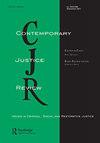Restorative justice: a substantive, intergenerational and ecological approach in the Amazon Region of Brazil
Q2 Social Sciences
引用次数: 1
Abstract
ABSTRACT From the report of a case in which restorative justice references were used to address a conflict involving chestnuts gathers and family farmers in the Brazilian Amazon, the article reflects on the conditions of applying restorative justice concepts and procedures to treat socio-environmental conflicts. Restorative philosophy adopts a substantive vision concerned with an intergenerational and ecological ethic that can contribute to the realization of justice and the sustainability of peace in Amazonian scenarios. In order to face an alienating vision that disregarding human multidimensionality, the authors suggest a holistic understanding of reality that understands nature as part of what we are, that we inhabit, with which we are ineluctably interconnected and that is impacted by human actions, especially those of apolitical character and economical. This comprehending leads them to an ecological and intergenerational perspective of restorative justice that transcends the de-identification of humanity with nature. Understood in this way, restorative justice implies responsibility towards human beings and nature. This means looking for solutions that meet not only the needs of the actors directly and indirectly affected by a particular offense; in addition to intersubjective issues, it concerns the satisfaction of demands for social justice and environmental conservation, inviting humanity to render intergenerational accounts. The article concludes that an ecological and intergenerational view of restorative justice requires exercises of imagination and effective practice capable of facing the tangles of the humanity-nature relationship within extended perspectives that account for considering the multidimensionality of the human experience.恢复性司法:巴西亚马逊地区的实质性、代际和生态方法
摘要从一个案例的报告中,本文反思了应用恢复性司法概念和程序处理社会环境冲突的条件。在该案例中,恢复性司法被用于解决巴西亚马逊地区栗子采集和家庭农民的冲突。恢复性哲学采用了一种实质性的愿景,涉及代际和生态伦理,有助于在亚马逊地区实现正义和和平的可持续性。为了面对一种无视人类多维性的异化愿景,作者们建议对现实进行全面的理解,将自然理解为我们的一部分,我们居住的地方,我们不可避免地与之联系在一起,并受到人类行为的影响,尤其是那些非政治性和经济性的行为。这种理解将他们引向恢复性司法的生态和代际视角,超越了对人类与自然的去认同。这样理解,恢复性司法意味着对人类和自然的责任。这意味着寻找不仅满足直接和间接受特定犯罪影响的行为者需求的解决方案;除了主体间性问题外,它还涉及社会正义和环境保护需求的满足,邀请人类进行代际核算。文章的结论是,恢复性司法的生态和代际观需要想象力和有效实践,能够在考虑人类经验多维性的扩展视角下面对人与自然关系的纠缠。
本文章由计算机程序翻译,如有差异,请以英文原文为准。
求助全文
约1分钟内获得全文
求助全文

 求助内容:
求助内容: 应助结果提醒方式:
应助结果提醒方式:


